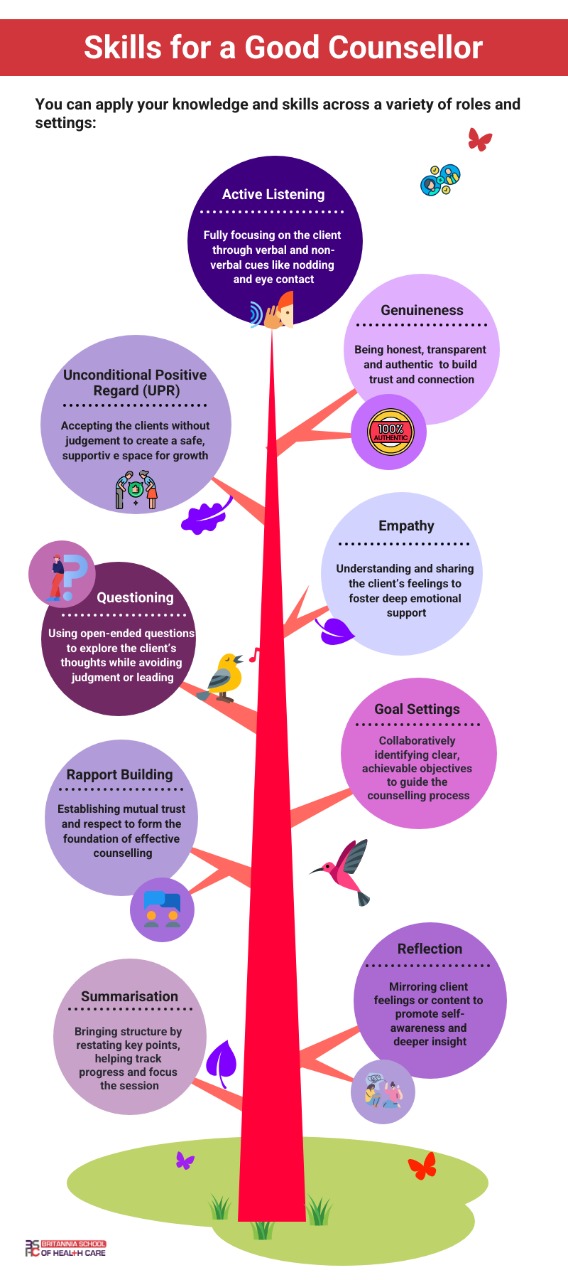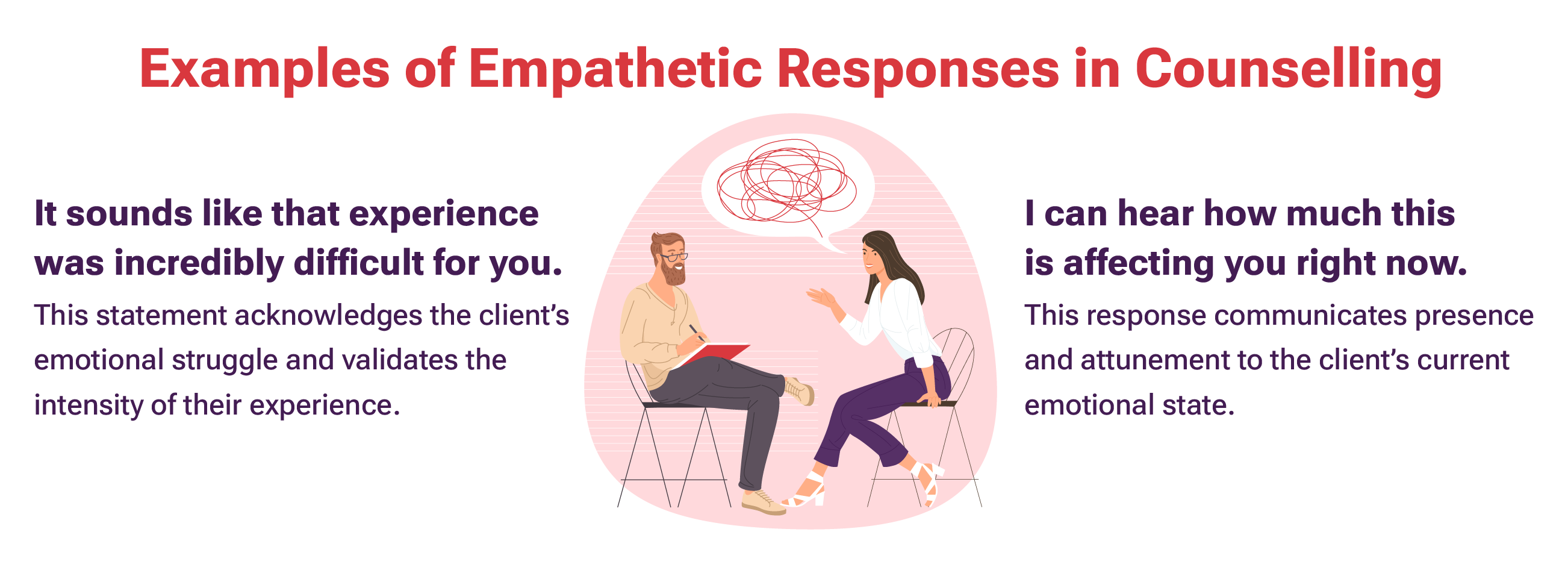Have you ever had a conversation with someone who truly listened without interrupting, judging, or rushing to offer solutions? Maybe it was a friend, a teacher, or a colleague who made you feel heard and understood. That moment likely stayed with you because it created a sense of connection and trust. This is the essence of good counselling, and it begins with core counselling skills.
Counselling skills are not just tools for therapists; they are powerful communication techniques that help build empathy, trust, and clarity in everyday interactions. In this blog, we will explore essential counselling skills that form the cornerstone of effective therapeutic practice.
As Carl Rogers, a pioneer of Person-Centred therapy, once said:
“The curious paradox is that when I accept myself just as I am, then I can change.”
(Rogers, 1961) (Rogers, 1961)
What is counselling?
Counselling is a structured, collaborative process that enables individuals to explore personal challenges, develop self-awareness, and work towards positive change in a supportive and confidential environment. It provides a safe space for clients to express their thoughts and emotions, gain clarity, and build strategies for personal growth and wellbeing.
Why core counselling Skills are key to build therapeutic relationship?
Core counselling skills are fundamental to building an effective therapeutic relationship, as they foster trust, emotional safety, and open communication. The quality of this relationship significantly depends on the counsellor’s ability to apply core counselling skills with competence and sensitivity.
What Skills should a good counsellor have?
A good counsellor should possess a combination of interpersonal, emotional, and professional skills that enable them to support clients effectively.
- Active listening
- Unconditional Positive Regard (UPR)
- Genuineness
- Empathy
- Questioning
- Rapport Building
- Goal Setting
- Summarisation
- Reflection

What is Active Listening?
Active listening is the skill of fully focusing on and understanding a client’s message both verbal and non-verbal. In counselling, active listening is vital for building trust and encouraging open communication.
“Most people do not listen with the intent to understand; they listen with the intent to reply.”
(Stephen R. Covey, 1989) (Stephen R. Covey, 1989)
What are the Key Techniques for Showing Active Listening in Counselling?
The key Techniques for showing Active Listening includes:
- Nodding and facial expressions to demonstrate attentiveness.
- Paraphrasing to ensure accurate understanding.
- Appropriate eye contact to maintain connection.
- Avoiding interruptions to support uninterrupted client expression.
What is Empathy?
Empathy is the ability to understand and share the feelings of another person from their perspective, without judgment. In counselling, empathy plays a critical role in building trust and forming a genuine therapeutic connection.
What are some Examples of Empathetic Responses in Counselling?
Empathetic responses in counselling are verbal and non-verbal expressions that show genuine understanding, acceptance, and emotional alignment with the client’s experience. Here are some examples of empathetic responses include:

What is Genuineness?
Genuineness, or congruence, refers to the counsellor being authentic, honest, and transparent in their responses. When counsellors are congruent, clients feel safer to be their true selves.
Being genuine involves:
- Expressing honest reactions in a respectful way.
- Avoiding a clinical or overly detached tone.
- Modelling authenticity to encourage the client to do the same.
What is Unconditional Positive Regard (UPR)?
Unconditional Positive Regard (UPR), introduced by Carl Rogers, is a core principle of person-centred counselling. “Unconditional Positive Regard means caring for the client as a separate person, with permission to have their own feelings, experiences and values”.
What are some Examples of Unconditional Positive Regard in Counselling?
Example of Unconditional Positive Regard (URP) involves:
- Accepting disclosures without criticism
A client shares involvement in past behaviours they feel ashamed of (e.g., substance misuse or infidelity). Instead of reacting with disapproval, the counsellor says:
“Thank you for trusting me with that. You have taken a brave step by being honest.”
What is Questioning?
- Open-ended questions: Encourage expansive answers (“How did that experience affect you?”).
- Closed questions: Provide specific facts (“Did that happen recently?”).
What is Rapport Building?
Rapport building is the process of creating a trusting and respectful relationship between the counsellor and client. It involves active listening, empathy, and genuine interest, helping clients feel safe, understood, and open to sharing. Strong rapport lays the foundation for effective and meaningful counselling sessions.
What is Example of Rapport Building?
- Shows empathy and understanding
- Reduces client anxiety
- Establishes trust and emotional safety early on
What is Goal Setting?
Goal setting in counselling is a collaborative process where the counsellor and client work together to identify clear, realistic, and meaningful objectives for therapy. These goals provide direction, focus, and measurable outcomes for the counselling journey.
What is Summarisation?
Summarisation in counselling is the skill of briefly reviewing the main points, emotions, or themes shared by the client during a session. It helps bring clarity, structure, and focus to the conversation. It is typically used at key moments such as the end of a session or before transitioning topics to highlight insights, check understanding, and reinforce progress.
What is Reflection?
Reflection in counselling is the practice of the counsellor repeating or rephrasing the client’s words or feelings to show understanding and encourage deeper self-awareness. This technique helps clients feel heard and validated, while also helping them explore their thoughts and emotions more clearly.
Conclusion
Mastering core counselling skills is essential for building effective, compassionate, and ethical therapeutic relationships. Counsellors can build strong, trusting relationships that encourage openness, self-exploration, and growth. These techniques not only enhance communication but also create a safe, non-judgmental space where clients feel valued and understood. Whether you are new to counselling or an experienced practitioner, continuously developing these core skills is vital to delivering impactful and compassionate support that leads to meaningful outcomes.

